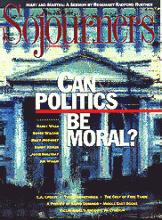It was a story that could have been wished into existence by little J. Danforth Quayle himself. It happened in the slow news days of August. The Republicans, gathered in convention, were calling for holy war in America. In the virtual reality of the Astrodome, it appeared that the convention might climax with the blood sacrifice of a lesbian feminist. Only then would the angry Republican god be placated, and the holy state of party unity secured.
Meanwhile on the outside, in much-maligned Manhattan, Woody Allen emerged as the living proof for Quayle's theory about a decadent American cultural elite. Whatever the legal status of Allen's various admitted and alleged actions with regard to Mia Farrow's children, the word "decadent" certainly begins to fill the moral bill. Even if the 56-year-old Allen's only offense is his flaunted sexual relationship with his former partner's young daughter, that's enough to qualify him for the status of a moral pariah.
And, of all American pop cultural figures, none is more self-consciously elitist than Allen. It's not just that he occasionally writes for The New Yorker; or that he's been known to issue social pronouncements on the op-ed page of The New York Times (the paper with no comics section). It's not even the snobby way that Allen keeps refusing, year in and year out, to attend the Academy Awards ceremony. These are all just symptoms of the smug elitism that lies at the heart of Allen's public persona.
Read the Full Article

